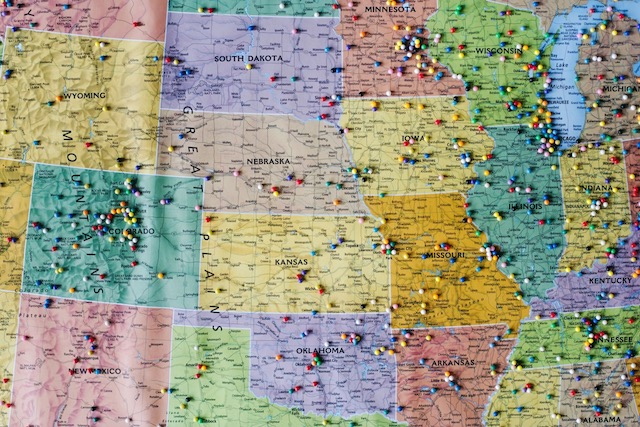Selling grocery items online is a growing niche, but one notorious pitfall is the fact that various different states tax grocery items differently. For example, groceries are taxable at the normal rates in Alabama, but totally exempt in Arizona. But in Georgia groceries are not subject to the state’s 4% sales tax rate but are subject to local (city, county, etc.) sales tax rates! Confusing, right?
If you sell online and have nexus in various states, you are required to keep up with all these rules or risk unhappy buyers wondering why you charged them sales tax. (…Or an unhappy State Department of Revenue wondering why you didn’t charge customers sales tax and demanding money out of your pocket.)
This list will help you sort out which states consider grocery items tax exempt. If a state isn’t on this list, then it considers grocery items fully taxable at the combined local rate. We’ll also show you how to collect the right amount of sales tax in every state whether you have your own shopping cart or sell on a platform like Amazon FBA or Walmart.
States where grocery items are tax exempt
Keep in mind that this list refers to non-prepared grocery food. In some cases, items you buy at the grocery store such as soft drinks, candy and confectionare not tax-exempt or are taxed a different rate. Also note that foods prepared for consumption at a grocery store are taxable in all states.
Pro tip! If you sell on Amazon FBA, make sure you set up the correct product tax codes so Amazon knows how to charge sales tax on your grocery items in each state.
Always check with your state’s department of revenue or a knowledgeable sales tax accountant if you have a question. Sometimes the definition of “grocery items” can get a little tricky!
Alaska – grocery items are tax exempt
Arizona – grocery items are tax exempt
Arkansas – grocery items are tax exempt, though prepared foods, candy, soft drinks, and restaurant meals remain subject to sales tax.
California – grocery items are tax exempt
Colorado – grocery items are exempt from state tax, though local areas can levy a tax. Also, certain items are taxable, including carbonated water, chewing gum, seeds and plants to grow food, prepared salads and salad bars, cold sandwiches, deli trays, candy, soft drinks and hot/cold beverages served in unsealed cups through a vending machine.
Connecticut – grocery items are tax exempt
Subscribe to our free sales tax newsletter
Sales tax is complex, and always changing. But staying up to date on sales tax news is crucial for businesses. Sign up to stay on top of changes that can impact your sales tax compliance.
Sign upFlorida – grocery items are tax exempt
Georgia – Georgia does not require sales tax on grocery items, but this exemption does not hold for any local (county, city, etc.) taxes. Further, the exemption for “food and food ingredients” does not include prepared food, alcoholic beverages, dietary supplements, drugs, over-the-counter drugs, or tobacco.
Idaho – While grocery items are taxable in Idaho, the state does offer a sales tax credit for grocery items that residents can claim when they file income tax. Learn more about the grocery credit here.
Illinois – grocery items are not tax exempt, but they are taxable at a reduced rate of 1%. Candy, soft drinks, alcoholic beverages, and food prepared for immediate consumption do not qualify for the 1% rate.
Indiana – grocery items are tax exempt
Iowa – grocery items are tax exempt
Kansas – Starting January 1, 2023, the state sales and use tax rate on food and food ingredients, and certain prepared food, will be reduced from 6.5% to 4.0%. Starting on January 1, 2024, the state sales tax rate will be reduced to 2.0%. And, starting on January 1, 2025, the state sales tax rate will be reduced to 0.0%.
Kentucky – Food and food ingredients are exempt from sales tax. This exemption does not include candy, tobacco, alcoholic beverages, soft drinks, dietary supplements, prepared food or any food sold through vending machines.
Louisiana – food sold for preparation and consumption in the home is tax exempt at the state level, though counties and other local jurisdictions may levy a tax
Maine – The exemption for food products for home consumption is limited to Maine’s definition of “grocery staples.”
Maryland – grocery items are tax exempt
Massachusetts – grocery items are tax exempt
Michigan – grocery items are tax exempt
Minnesota – grocery items are tax exempt
Mississippi – As of July 1, 2025, grocery items are taxed at the reduced rate of 5%.
Missouri – Grocery items are taxable, but taxed at a reduced state rate of 1.225%.
Nebraska – grocery items are tax exempt
Nevada – grocery items tax exempt
New Jersey – grocery items are tax exempt
New Mexico – grocery items are tax exempt
New York – While grocery items are tax exempt, New York has some interesting considerations and exceptions. Click here for extremely detailed guidance on what grocery items are and are not tax exempt in New York.
North Carolina – Sales of grocery items are exempt from North Carolina state sales tax, but still subject to local taxes at a uniform reduced rate of 2%.
North Dakota – grocery items are tax exempt
Ohio – grocery items are exempt if sold for off-premises consumption
Oklahoma – grocery items are exempt in Oklahoma beginning August 1, 2024. Note: Alcoholic beverages, ready-to-eat prepared foods, and grocery deli items, are still taxable.
Pennsylvania – grocery items are tax exempt, and in Pennsylvania, this includes candy and gum but not alcohol.
Rhode Island – grocery items are tax exempt
South Carolina – Unprepared food that can be purchased with federal food stamps is exempt from state sales and use tax, but may be subject to other local sales and use taxes.
South Dakota – grocery items are taxable.
Tennessee – grocery items and ingredients are taxable, but taxed at a reduced state rate of 4%. Groceries are fully taxable at local rates.
Texas – grocery items are tax exempt
Utah – This is one of the more confusing states when it comes to taxing groceries. Grocery items are taxable, but taxed at a reduced rate of 1.75%. These transactions are also subject to local option and county option and results in a total combined rate on grocery food of 3 percent throughout Utah.
Vermont – grocery items are tax exempt. (This includes chips and soft drinks sold at grocery stores, even though these items are taxable in Vermont in other situations. You can read more about the taxability of chips and soft drinks here.)
Virginia – grocery items are taxable, but taxed at a reduced rate of 1.5% + a 1% local option tax in applicable areas
Washington – grocery items are tax exempt
Washington D.C. – grocery items are tax exempt
West Virginia – grocery items are tax exempt
Wisconsin – grocery items are tax exempt, though some snack foods are excluded from this exemption.
Wyoming – food for domestic home consumption is exempt



